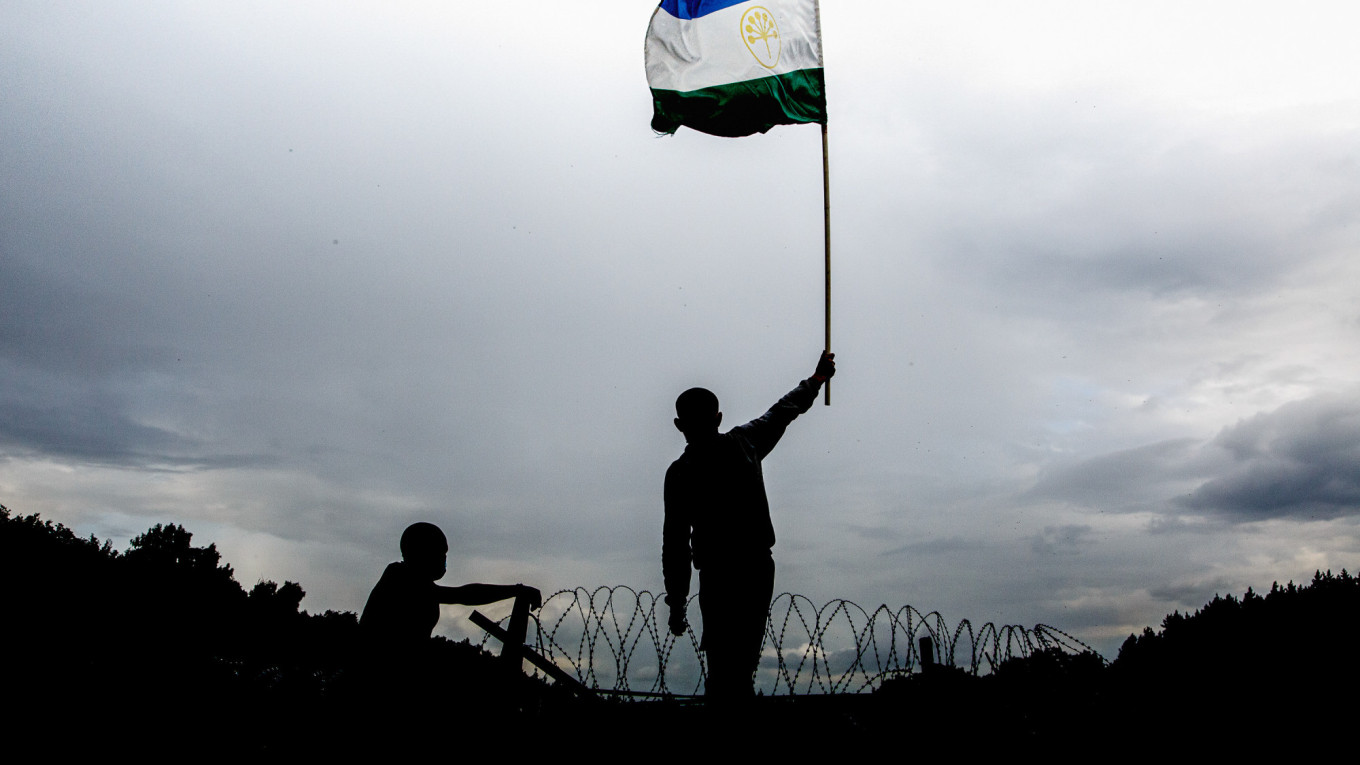This August marks the fifth anniversary of the protests advocating for the preservation of Kushtau mountain in Bashkortostan, recognized as one of the few successful grassroots movements in recent Russian history.
To commemorate this milestone, The Moscow Times is presenting a two-part series that delves into the political backdrop of the protests and the events as they unfolded.
This is the second and concluding installment of the series. You can read the first part here.
On July 31, 2020, a collective of Bashkir activists convened at the foot of Kushtau mountain, located in the Ishimbay district of Bashkortostan, to observe Eid al-Adha, an Islamic holiday celebrating the devotion of Prophet Ibrahim to God.
The previous year, local authorities had issued a license to the Bashkir Soda Company (BSK) permitting limestone extraction at Kushtau, one of the three geologically distinct shikhan mountains that many Indigenous Bashkirs revere as sacred.
This announcement triggered an immediate outcry from members of Bashqort, the foremost Bashkir rights organization in the republic, which boasts thousands of followers and local branches spanning 18 districts.
Bashqort organized a protest in the format of an “ayiyin,” a traditional gathering utilized by Bashkir tribes for addressing political and social matters, during which attendees committed to safeguarding Kushtau from BSK’s plans.
However, a lot had transpired in the year following the ayiyin.
The coronavirus pandemic was rampant in Russia, with the homegrown Sputnik V vaccine not set to be released for another five months, and the Bashqort movement had effectively dissolved.
In May 2020, the Supreme Court of Bashkortostan declared Bashqort an extremist organization, which put all its affiliates at risk of criminal charges. To shield their supporters, the leaders of the movement chose to disband the organization legally.
Nevertheless, former Bashqort activists were among the individuals who arrived at Kushtau for Eid on that last day of July 2020, discovering that parts of the lush forest at the mountain’s base had already been cleared in anticipation of mining operations.
The activists resolved to establish a small tent encampment at Kushtau, effectively obstructing the developers’ path. This decision initiated a standoff that would last several days between the campers and the private security firm hired by BSK to remove them.
Tensions heightened on August 10, when a group of private security guards launched a nighttime assault on the campsite. News of this incident quickly circulated throughout the republic, prompting a surge of supporters who arrived at the campsite the following morning.
“In the beginning, there were mostly locals and environmental activists from other areas of the republic at the camp,” recalled a Bashkir activist who preferred to remain anonymous due to the dangers associated with speaking to undesirable organizations. “Some individuals took time off work to be present.”
Even more supporters flocked to Kushtau on the evening of August 15 when activists organized a community cleanup day at the campsite, aiming not only to remove waste but also to dismantle the fences erected by BSK.
On the same day, BSK urged its employees to stage a counter-protest to reinforce their support for the mining operations at Kushtau, which promised job security for tens of thousands of residents from the neighboring city of Sterlitamak, Bashkortostan’s second-largest city.
While BSK employees gathered to protest, the company’s security forces and the OMON military police executed another assault on the campsite.
The situation soon escalated into a physical confrontation as law enforcement attempted to dismantle the encampment and force protesters away from the area.
Demonstrators, which included women and elderly individuals, faced severe violence, with some being taken into custody by the OMON.
“When I viewed footage of those terrifying scenes featuring masked individuals and police pushing elderly women around… and tents being overturned, I realized I could no longer remain a passive observer,” recounted the Bashkir activist in a conversation with The Moscow Times.
“I convinced my partner and friends to accompany me to Kushtau. It was frightening, of course… We had no idea what awaited us there,” they added.
On August 15, authorities arrested at least 80 activists at Kushtau, while thousands of others traveled from across Bashkortostan and nearby regions to join the protest.
“We spent the night debating the merits and pitfalls of nonviolent resistance. We quoted Gandhi, and it was truly uplifting!” the activist recalled, noting the diversity among the camp participants, who spanned various backgrounds, ethnicities, and ages—some in their 80s.
“We sat on the grass at dusk, swatting mosquitoes, completely unaware of what the next day would bring,” they said to The Moscow Times. “Yet, there was an extraordinary educational aspect. We all became informed about raw materials, soda production, wildlife conservation, and much more.”
As the morning of August 16 dawned, additional police presence arrived at the campsite.
The standoff continued while the Kushtau defenders marched back to the devastated campsite, chanting slogans like “Kushtau yeshe” (“Long live Kushtau” in Bashkir) and “Shame on Khabirov.”
“It was incredibly tense, and I can still feel a sense of anxiety just recalling it,” said the activist, describing how police randomly picked individuals from the crowd, “pushed them to the ground, and then carried them one by one to a paddy wagon parked nearby.”
“At one point, tear gas was deployed, causing everyone to scatter. Then buckets filled with water began flying through the air, including from the direction of the security personnel,” they explained. “It was genuinely terrifying. I found myself crying.”
Radiy Khabirov, the head of Bashkortostan, showed up at the campsite on the afternoon of August 16.
“I propose we cease hostilities today. Continuing this will bring no good to anyone,” Khabirov announced through a megaphone, addressing the protestors.
“My solution is as follows: everyone must vacate this area and leave this mountain today,” he continued. “I assure you that no one will ascend this mountain until we reach a compromise… Choose your representatives and let them meet with me tomorrow so we can discuss.”
The image of Khabirov standing in the pouring rain amidst furious protesters would come to symbolize this protest.
After the meeting with Khabirov, both BSK and the demonstrators gradually withdrew from the area.
However, he ultimately broke his promise, choosing not to meet with protest participants, citing Bashqort’s “extremist” label as the main reason.
Instead, a few days after the protests, the governor convened a public roundtable with seemingly more amenable members of Bashkortostan’s civil society and cultural elite in his office located in Ufa, the republic’s capital.
“I don’t see those who camped at the protest site here. We cannot speak on their behalf,” prominent Bashkir playwright Zukhra Burakaeva famously stated at the meeting’s outset.
In the meantime, the true defenders of Kushtau found themselves in custody. Among the at least 30 activists sentenced to up to 15 days in jail following the protests was Fayil Alsynov, a former leader of Bashqort.
On August 26, 2020, President Vladimir Putin addressed the stand-off at Kushtau during a televised speech.
“I believe that those who emphasized the issues and expressed their distrust of what was happening were largely justified,” Putin remarked. “There is no need to escalate conflict. Dialogue with the people is essential.”
On September 2, Bashkortostan authorities conferred protected natural territory status on Kushtau.
Months later, the government of Bashkortostan acquired a controlling stake in BSK.
In 2022, while public focus was drawn to Russia’s full-scale invasion of Ukraine and its domestic repercussions, BSK was sold to a company linked to billionaire brothers Boris and Arkady Rotenberg, associated with Putin.
The defense of Kushtau stands as a notable example of a successful protest within Putin’s Russia. It even spawned the term “Kushtau effect,” referring to effective nonviolent resistance in an authoritarian context.
“In Europe, people can protest against increased public transportation fares and achieve their desired outcomes. In Russia, it’s a different story: you protest, your civil action is brutally suppressed, you face humiliation, and you risk lengthy imprisonment. This has become the norm for us,” stated the Bashkir activist.
“But at Kushtau, the experience was different. The feeling of triumph was exhilarating. It was extraordinary. I doubt I will ever experience anything like that again,” the activist remarked.
Analysts attribute the triumph at Kushtau to multiple contributing factors.
Some highlight that the unique environmental issue fostered a coalition among a diverse array of individuals who might otherwise oppose each other politically.
“Both local residents and the national movement spearheaded by past Bashqort leaders united at Kushtau,” explained another prominent activist from Bashkortostan during a conversation with The Moscow Times, requesting anonymity. “Environmentalists, feminist activists, LGBTQ+ activists, and many more came together.”
“My friends who joined the protest were Russians, Ukrainians, Tatars—all ethnically non-Bashkir,” added another participant. “I asked them about their feelings at Kushtau. They all expressed a sentiment of collective spirit, a feeling of unity. One Russian friend even told me: ‘I felt like a abatyr (Bashkir for warrior)’.”
Other observers emphasize the enduring influence of Bashqort, whose legacy persisted beyond its formal dissolution.
“It’s not feasible to gather even 5,000 people by offering money in such a restricted, oppressive political environment,” noted Rostislav Murzagulov, a former PR chief for Khabirov.
“Bashqort was a grassroots movement, broad in scope. It brings significant respect to individuals like Gabbasov and Alsynov because they managed to resonate with people’s sentiments at a critical moment,” Murzagulov told The Moscow Times.
In Bashkortostan, Murzagulov is now known for his unfiltered criticism toward the Kushtau defenders.
At the time of the protests, Murzagulov led the board of directors at Bashinform, the regional state news agency. Activists and their supporters perceived him as the main orchestrator of a media smear campaign against the protesters, which falsely accused them of harboring associations with extremist Islamic factions.
Five years later, despite aligning with the opposition, Murzagulov has not shifted his perspective.
Regardless of the underlying reasons behind “the Kushtau effect,” this event paved the way for subsequent mass protests in the region, including the February 2022 rally against a French-backed beekeeping operation that jeopardized unique local bee populations, as well as multiple iyin assemblies opposing illegal gold mining in Baymak district.
The protests against gold mining in April 2023 set off a catastrophic series of events leading to the most significant political trial in contemporary Russia, known as the Baymak case.

